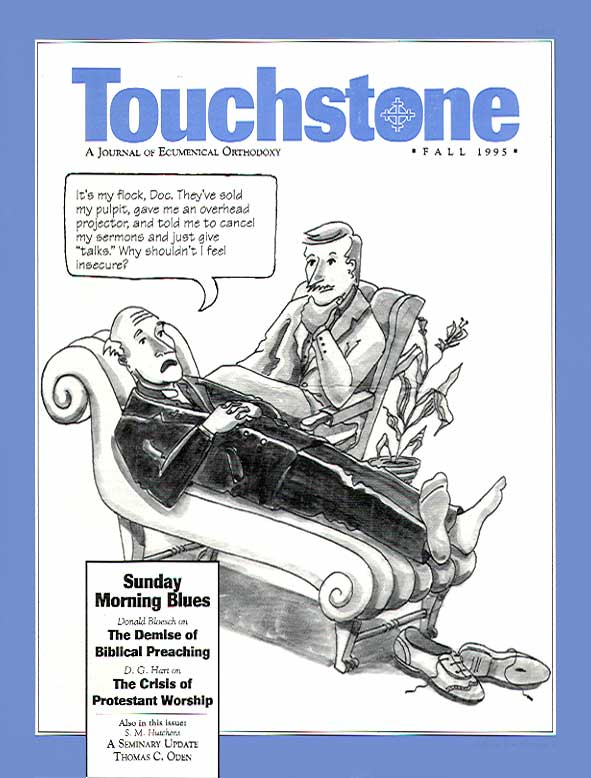Abreast of the Times
The Quiet Modernization of a Divinity School
by S. M. Hutchens
My years at Trinity Evangelical Divinity School, in Deerfield, Illinois, were good, happy ones. I transferred in from another school where the relations between students and faculty weren’t as cordial, and it was refreshing to work under competent teachers, most of whom were not afraid to get to know their students. I stayed to earn two degrees there in the early ’80s.
I was never converted to Trinity’s statement of faith. The problem was not that I was too liberal, but perhaps a bit too “catholic.” When asked to for my personal doctrinal statement for a placement file, for example, I submitted the Nicene Creed and was told this would not suffice. It had to be, like Trinity’s own doctrinal statement, a homemade job that addressed the concerns of evangelicals. I found this odd, but it was consistent with a perennial feature of Trinity itself—a tradition of homemade theology, once done up to the plain and relatively benign tastes of the Evangelical Free Church, but now with a different and far more ominous smell.
The biggest sticking point for me in the old days was the doctrine of autographal inerrancy. It did not seem that basing one’s faith on perished documents—or even on the Bible alone—was a good thing, since that provided no authority for the interpretation of Scripture other than the opinions of private individuals or the disjointed segments of Christendom they represent. During my seminary years I came to agree emphatically with Philip Schaff and the other Mercersburg theologians:
In order that the Scriptures may be taken as the exclusive source and measure of Christian truth, it is necessary that the faith in Christ of which they testify should be already at hand, that their contents should have been made to live in the heart by the power of the Holy Spirit accompanying the word and the church. . . . The Socinians, Swedenborgians, later Unitarians, and other sects, made the same strenuous appeal to the Scriptures as their only authority, but they stood quite off from the true living ground of the Reformation notwithstanding. (Schaff, The Principle of Protestantism, Ch. 1)
In other words, belief in biblical inerrancy, autographal or otherwise, does not protect you from heresy. Only the Holy Spirit can do this, and he does it by binding the Word to the Church. Whatever difficulties this concept might involve for modern Protestants, it is not just “in here,” but “out there”—in the Church as a whole—that the interpretive authority lies, and the interpretation is what makes the difference between a Swedenborgian inerrantist and a Christian.
When I left Trinity to continue my theological studies I was on good terms with everyone there. Although I would have liked to return as a teacher, there was little possibility of it, since I could not fully affirm the doctrinal statement, and was unwilling to finagle my way around it. (Teachers of theology especially have to be thoroughly committed to their schools’ beliefs, their interpretations of the doctrinal statements well within the frame of reason.) The disagreements we had, however, were still brotherly ones, such as those that might exist, say, between a conservative Baptist and a traditional Anglican. That is no longer the case. Trinity has changed.
The World of Theological Modernism
Entering doctoral studies placed me firmly in another and distinctly unbrotherly world, the world of theological modernism that was descending into the advanced state of decomposition now being called post-modernism. This world was founded upon a way of thinking that could barely conceal its hostility to orthodox Christianity, and did conceal it, I became convinced, only because it was still funded by people who expected the professors to make Christian noises, however faint those noises might be. By the grace of God, I was able to take a degree chiefly because I had an advisor who was still a believer and had enough power to protect me from that hostility.
The single most powerful ideological influence on the campuses where I worked during those years was, and remains, feminism. Feminism is not simply, as they say, a “gender thing.” It is a worldview that seeks to unravel and reknit the whole fabric of human (not just Western) history, religion, and culture, which is based, as the feminists have correctly discerned, on the pervasive influence of male-dominated hierarchies—patriarchalism. The greatest and most dangerous of these patriarchal hierarchies is Christianity. Daphne Hampson, a thorough and consistent feminist scholar who has renounced Christianity, is in complete agreement with Christian orthodoxy when she says,
Feminism represents the death-knell of Christianity as a viable religious option. . . . It is conservative Christians who, together with the more radical feminists, perceive that feminism represents not just one crisis among many. For the feminist challenge strikes at the heart of Christianity. . . . Christianity is a religion of revelation with a necessary foot in history. It cannot lose that reference as long as it remains Christianity. And that reference is to a patriarchal history. ( Theology and Feminism, pp. 1, 5)
The power of feminism over the religious academy was manifest principally in the control of its grammar. Feminism was acutely conscious of the connection between language, thought, and belief, and knew that enforced egalitarian speech patterns would eventually lead to a way of thinking in which Christianity could no longer impede the progress of its revolution. The more sophisticated feminists clearly saw the connections between the grammar of the Bible and its doctrines of God, man, and Christ. They knew that when you hissed down a man who in class referred to his “wife” (placing her in a relation in which she had a “husband” who was her patriarchal custodian), you could probably intimidate him before long—and intimidate they did—into being uncomfortable with the idea that the perfect image of the invisible God is a male. They knew that when every paragraph had to be balanced in accordance with egalitarian formulas, any Scripture in which they were not would soon become a relic of past belief, any authority it had being subject to a feminist gloss. Their success, thanks largely to the cowardice of Christians who will not stand up to them and be accused of “fundamentalism,” has been incalculably great.
The Quiet Revolution at Trinity
After I finished the doctorate, I occupied myself with other things and did not pay too much attention to Trinity, assuming that it continued to lope along in its accustomed fashion. My wife and I still made occasional contributions and received glowing reports about how it was still the same, still educating its students in God’s inerrant Word, hiring brilliant teachers with degrees from legendary schools who wrote stacks of phenomenally learned books. I felt I could still recommend the school, for although I did not think as well of it as it thought of itself, it was still one of the few places a person could get graduate training for Christian service without having his faith constantly placed under attack. Not long ago, however, I came across a fellow who is presently a student there, and he mentioned that Trinity now had an inclusive language statement—a very significant advance, news of which for some reason I had not encountered in its fundraising letters and Christianity Today advertisements. I asked him to document this, and he did, bringing me a copy of the 1992–1995 Graduate Studies Handbook for Students in the M.A., M.A.R., M.R.E., and Th.M. Programs. In it I found this proclamation, ringing with all the force of a religious and ethical imperative:
In recognition of the divine act of creation whereby the “image of God” has been equally given to women and men . . . as members of the faculty of Trinity Evangelical Divinity School, and leaders in the Church of our Lord, we recognize that God has given his gifts to both men and women in the body of Christ. Therefore, as we teach in class, speak in the pulpit, or write our books and articles, we commit ourselves, before God, to be sensitive about the presence and needs of both sexes and the forms of address that will represent both genders rather than unthinkingly adopt potentially offensive conventions of speech. Our decision is based on the fact that God’s gift of the imago Dei to both women and men has forever settled the question of their equal worth, value, and meaningfulness as persons. . . . We pledge ourselves as faculty and administration to encourage students, staff members, and the wider Christian community to use language and illustrations which include women and men . . . .
The mandate to use inclusive language at TEDS carries with it the responsibility to be creative in writing without compromising religious faith or grammatical accuracy. . . . (p. 24)
Thereafter follows a list of rules for the use of pronouns and a table in which “gender biased terms,” now to be avoided, are listed next to “inclusive language alternatives.” “Husband” and “wife” are no longer acceptable and are to be replaced with “spouse.” “Mankind” becomes “humanity,” and so forth.
The teaching presented here, with the sound of learning and piety that (“before God”!) commands assent from every believer who does not wish to be stupid or immoral, uses the unquestionably biblical teaching that men and women are both made in the image of God and therefore are of “equal worth, value, and meaningfulness as persons” to attack, via the usual feminist rules of grammar, the equally biblical hierarchy in which the woman’s equality of worth stems from her consubstantiality with the man to whom she is subordinate. In both the orders of creation and redemption the Scriptures regard the man as the head of the woman—her origin and her Lord—who gives her her name, and whose personal name comprehends hers and the entire race of which the man—not the woman, or men and women equally—is the preeminent and representative member.
The Undermining of Trinity Theology
The state of theological reflection at Trinity is apparently such that the majority of its faculty cannot see beyond the biblical doctrine of equality as interpreted by equity feminism. It is oblivious to the universal implications of the Second Adam’s appearance as a male. It cannot see this as an infinitely emphatic restatement of the first theme, the meaning of a divine Son (not a daughter or daughter/son) including male headship that the Scriptures clearly expect our subordinate orders of church and family to reflect in the peculiarly male offices of pastor and husband. As much offense as this may cause, as many howls of wounded rage as it may evoke, it has been clear to the Church of the ages, which has ordered itself accordingly. It is clear to radical feminists. It is clear to those who have the courage to oppose feminist attempts to impose their religion on the churches. But to the learned and pious Trinity faculty, alas . . . .
If translations of the Bible into traditional English reflect the biblical doctrines of God, man, and Christ, the neutered grammar mandated by the Trinity faculty denies it. When the human race, for example, is comprehended by the Scriptures under ho anthropos, the translation “man” comports with the anthropology of Genesis and St. Paul. Trinity students, however, are expected never to use man this way, since their teachers regard it as not only insensitive, but also theologically wrong.
To this the orthodox Christian is compelled to reply that the relation of the genders, reflected in not only the theology but also the grammar of Scripture—a theology and grammar now to be abandoned in the Trinity paper, pulpit, and lectern—reflects a patriarchy where God the Father is the head of the Trinity and the Son is subject and obedient to his will. The imago Dei in which man was created, which the faculty says necessitates egalitarian language, becomes something in which the Son can no longer say “the Father is greater than I” for the same reason that Sarah can no longer please God by calling Abraham her lord, for she and he together are created in the image of an egalitarian God, and that means no more subordination.
What then stops us from reading human gender equality back into the godhead? Nothing, since the female element is now to be regarded as entirely equal to the male. The feminine aspect of God is no longer subsumed and contained in the defining and supervenient male aspect, but balanced by it: God is Mother as much as Father. That is the next logical step in Trinity’s decline, since the hierarchical foundations upon which the doctrine of the fatherhood of God rest, reflected as they are in the Bible’s “offensive conventions of speech,” have now been effectively undermined.
Those who have written this statement with the obvious intention of imposing it on the Trinity family—and therefore eventually on the evangelical world—cannot argue that this is merely an attempt to express the biblical doctrine of the sexes’ equality of worth, to which all orthodox Christians must assent. They show their hand very clearly by explicitly denying the validity of the biblical language of hierarchy: “Man,” for the human race, “husband” for the male spouse, “brethren” for fellow Christians of both sexes, are not acceptable. This is not the doctrine of the apostles; it is feminism, an ideology which, as Daphne Hampson has said, “strikes at the heart of Christianity.”
A Teaching Hard to Ignore
An argument that there is no explicit requirement that the inclusive language canon be followed and no sanctions are imposed on those who do not would be disingenuous, to put it mildly. The rule as stated in the Handbook is specifically worded so as to carry the moral and intellectual authority of the Trinity faculty, a faculty made up of “leaders in the Church of our Lord.” These people are, to the typical Trinity student, who has a Bible, but no bishop, creed, or ancient tradition, among the highest authorities in his world. He would not have come to Trinity otherwise. If they tell him his judgment and ethics leave something to be desired—that his opinions are actually unbiblical—if he will not use the language they prescribe, what greater censure could be imposed on the morally and intellectually earnest seminarian, eager to please, sensitive to criticism, and anxious to have his immensely authoritative teachers’ opinions on the things of God?
As orthodox Christians have repeatedly pointed out, here in agreement with the more radical and consistent feminists, the Christian faith and the language in which it expresses itself cannot be purely egalitarian. Male lordship and headship—patriarchalism—are necessary parts of it. What the Trinity faculty repudiates as gender-biased language, is a reflection of the very nature of Christianity itself, and so cannot be done away with without changing the faith in essence. If this is what the Trinity faculty believes, then the Trinity faculty is heretical. In the grand tradition of Arianism, Docetism, Ebionism, Socinianism, and the rest, it is using one biblical truth to exterminate another, and then, if that were not dishonorable enough, applying the force of its immense influence to bully those who come to Trinity for evangelical orthodoxy into buying political correctitude in the bargain.
What Philip Schaff said about the heretics’ belief in the authority of Scripture appears to be fleshing itself out at Trinity. While valiantly waving the inerrancy flag at its front door, as it must to attract students and money from the evangelical world, feminism has been welcomed in through the back, and is, as it has in so many other places, beginning to make the rules.
I have been told that these new guidelines are not strictly enforced, that the “mandate” is not yet considered binding, that some faculty members still strenuously resist. Experience indicates, however, that enforcement is simply a matter of time, once the rule itself is in place. And there it is, right in the Trinity handbook, a rule based on teachings its promulgators claim they find in the Bible. If indeed they are found in the Bible, it would seem wrong not to enforce them, the sooner the better. After all, the Bible is, as the Trinity people never tire of telling us, God’s inerrant Word. It would be a terrible thing to ignore what it teaches.
Trinity Evangelical Divinity School (recently renamed Trinity International University) declined Touchstone’s invitation to offer a response in this issue to the preceding article. [Ed.]
S. M. Hutchens is a senior editor and longtime writer for Touchstone.
subscription options
Order
Print/Online Subscription

Get six issues (one year) of Touchstone PLUS full online access including pdf downloads for only $39.95. That's only $3.34 per month!
Order
Online Only
Subscription

Get a one-year full-access subscription to the Touchstone online archives for only $19.95. That's only $1.66 per month!
bulk subscriptions
Order Touchstone subscriptions in bulk and save $10 per sub! Each subscription includes 6 issues of Touchstone plus full online access to touchstonemag.com—including archives, videos, and pdf downloads of recent issues for only $29.95 each! Great for churches or study groups.
Transactions will be processed on a secure server.
more from the online archives

33.1—January/February 2020
Do You Know Your Child’s Doctor?
The Politicization of Pediatrics in America by Alexander F. C. Webster
calling all readers
Please Donate
"There are magazines worth reading but few worth saving . . . Touchstone is just such a magazine."
—Alice von Hildebrand
"Here we do not concede one square millimeter of territory to falsehood, folly, contemporary sentimentality, or fashion. We speak the truth, and let God be our judge. . . . Touchstone is the one committedly Christian conservative journal."
—Anthony Esolen, Touchstone senior editor








